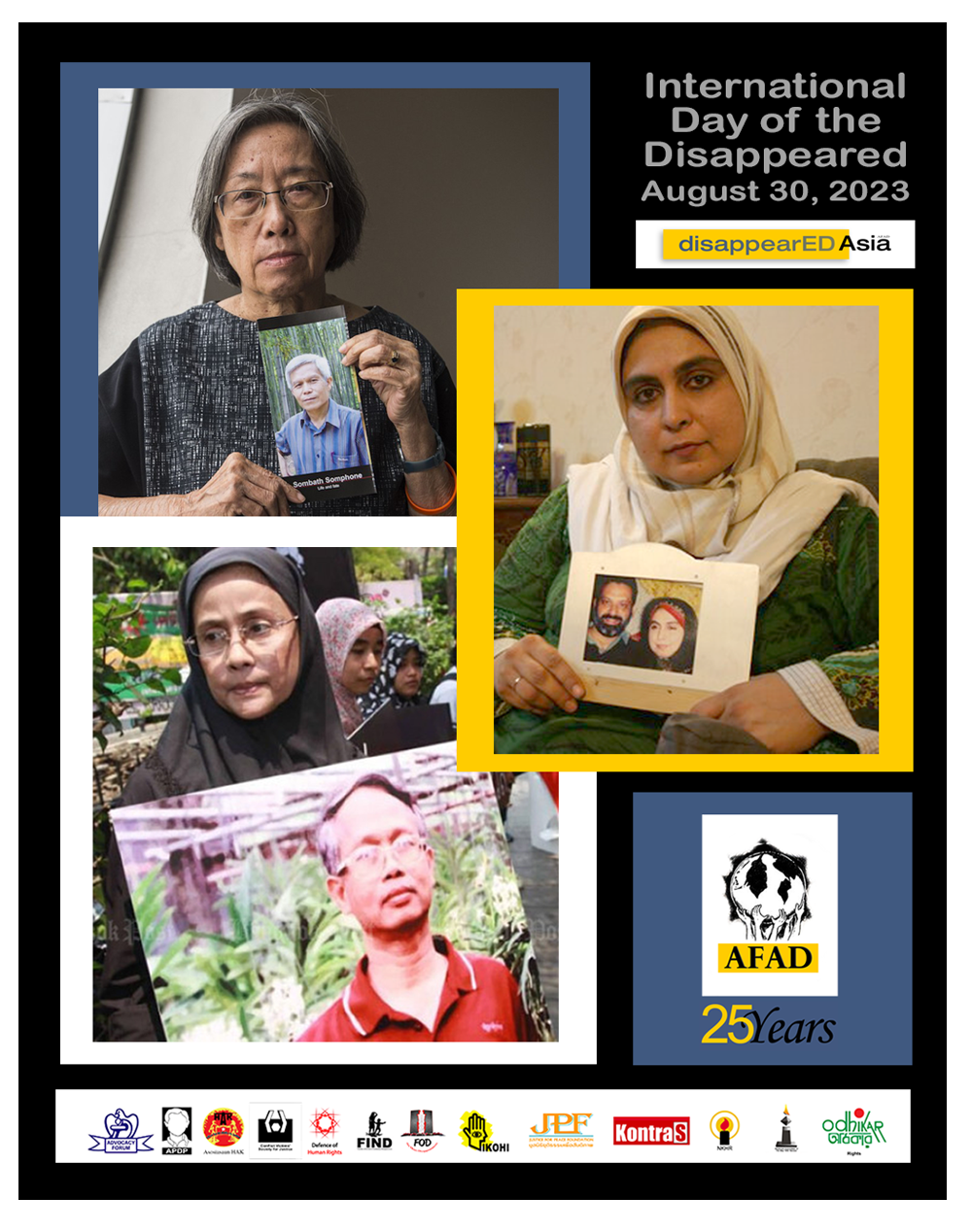On the observance of The International Day of the Victims of Enforced Disappearances (IDD), the Asian Federation Against Involuntary Disappearances (AFAD) emphasizes the importance of human lives and condemns any act that goes against basic human rights. In doing so, we bring attention to the International Convention for the Protection of All Persons from Enforced Disappearance (CPED), adopted by the United Nations Human Rights Council on 23 December 2010, that states “No exceptional circumstances whatsoever, whether a state of war or a threat of war, internal political instability or any other public emergency, may be invoked as a justification for enforced disappearance.”
Enforced Disappearance is when individuals are abducted by state authorities and are deprived of their basic human rights such as the right to have legal representation and their whereabouts are denied to even the closest of the family. Such disappearances can be categorized by elements such as arrest or detention by agents of the state, denial of information, isolation of the victims, and bypassing legal protections. These actions impact not only on the victims but their families, as well, who are left to cope with the sudden disappearance and its subsequent ill effects.
Enforced disappearances impose a range of difficulties on families, encompassing financial, social, psychological, and legal issues. Women predominantly bear the weight of addressing these challenges. In addition to tirelessly searching for the missing individuals, women must contend with the societal norms in their communities. They often carry the financial burden for the family, a role typically seen as the domain of men in conventional societies. Alongside this, women assume the responsibility for the emotional well-being of other family members grappling with the absence of a loved one. In some cases, enforced disappearances involve gendered violence and abuse, such as sexual assault or torture. This can lead to severe physical and psychological trauma for women victims, further exacerbating their distress. Moreover, they inflict further psychological distress due to uncertainty, fostering anxiety and trauma. Families suffer economic hardships from lost breadwinners, while legal obstacles hamper justice-seeking efforts. Stigmatization isolates them socially, and women face unique burdens, becoming caretakers and facing potential abuse. Seeking truth and justice is an arduous and prolonged endeavor, frequently accompanied by threats and intimidation, particularly when families seek answers regarding the fate of their disappeared. Nonetheless, many become advocates for justice, with women leading the charge. The impact spans generations, burdening children, and the lack of closure hinders healing, complicating grief.
Today only 98 out of 193 UN member states are currently listed as signatories to CPED. This makes it extremely difficult for the victim families to seek justice due to insufficient laws present to address the crime in many countries. Oftentimes these, already grieving, victim families are forced shut by the state authorities. Human rights defenders are constantly under threat due to authorities exerting efforts to undermine the cause and invalidate claims of the victim families.
Enforced disappearance has a multitude of negative effects on society. Enforced disappearance is an act utilized by a state and its agents to induce fear, silence voices, and deter activism through self-censorship, shrinking free expression. Enforced disappearances warn dissenters that challenging authorities could result in such measures. Moreover, they weaken trust in institutions safeguarding rights and law. Involvement in rights violations erodes faith in justice, lowering civic engagement as official channels seem ineffective. Hence, it makes the work of human defenders even more difficult because not only is the state un-cooperative but the victim families are too afraid to come forward and so is the general public since they are pressured into saving the ones that are left behind.
IDD serves as a reminder of the countless people who have disappeared in various contexts, including during armed conflicts, periods of political instability, counterterrorism operations, and situations of political repression. AFAD, in collaboration with its member organizations in Bangladesh, Jammu & Kashmir, Nepal, Pakistan, Sri Lanka, Indonesia, the Philippines, South Korea, Thailand, and Timor Leste has been tirelessly working towards putting an end to enforced disappearances. AFAD member organizations provide a platform to the grieving victim families to raise a voice and make an impact towards solving the crime of enforced disappearances.
On this day of the disappeared, amidst the numerous challenges and obstacles that surround the issue, AFAD calls on states to assume their duty to safeguard and adhere to the fundamental principles of human rights, rather than subjecting those who fight for preservation of these rights. The call emphasizes the importance of preserving the space for human rights defenders to operate freely, without fear of retribution, ensuring that their courageous efforts to uphold justice and dignity are not met with suppression and reprisal. AFAD urges the states affected to come on board with the CPED and put an end to the heinous crime of enforced disappearances.
AFAD salutes the women and their families who are at the forefront of the struggle to end enforced disappearance across Asia and the world.
PROTECTION, not persecution, of human rights defenders!
Jose Marie “Joey” Faustino
Secretary-General

 Asian Federation Against
Asian Federation Against 